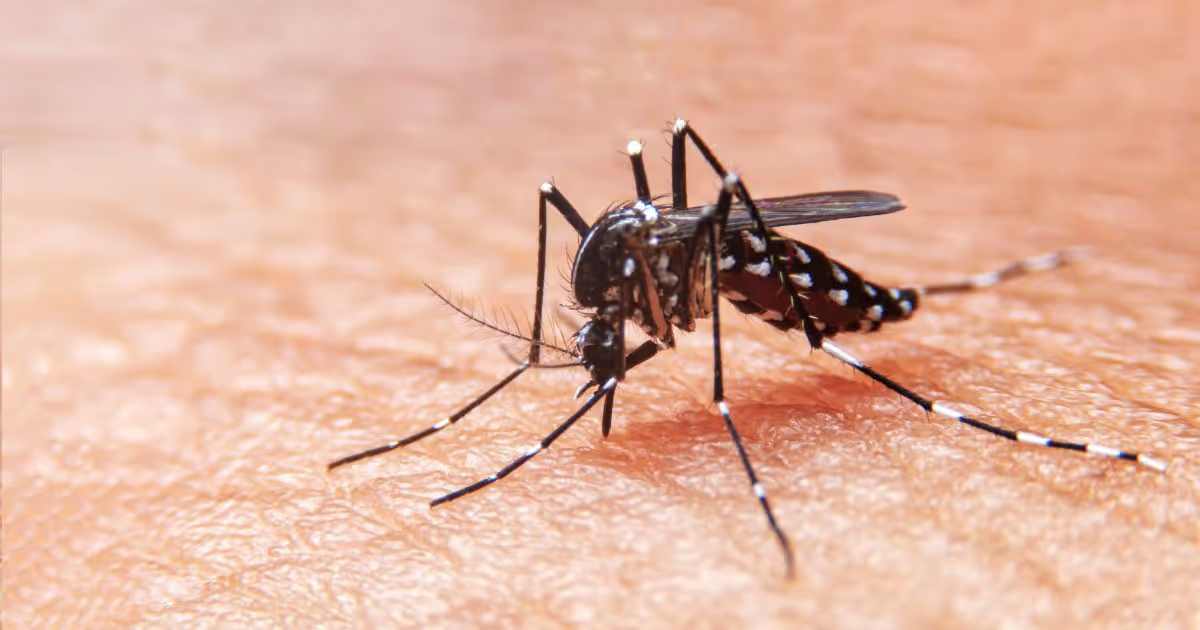เลือกหัวข้อที่ต้องการอ่าน
- ไข้เลือดออก (Dengue fever)
- ไข้เลือดออก สาเหตุเกิดจากอะไร?
- ไข้เลือดออก มีอาการอย่างไร?
- การวินิจฉัยไข้เลือดออก มีวิธีการอย่างไร?
- การรักษาไข้เลือดออก มีวิธีการอย่างไร?
- การป้องกัน ไข้เลือดออกมีวิธีการอย่างไร?
- คำถามที่พบบ่อย (FAQ)
ไข้เลือดออก (Dengue fever)
คือโรคที่เกิดจากการติดเชื้อไวรัสเดงกี (Dengue virus) โดยมียุงลายเป็นพาหะนำโรคสู่คนผ่านการกัดของยุงลายที่เคยกัดคนที่ติดเชื้อไวรัสเดงกี 1 ใน 4 สายพันธุ์ (DENV-1—DENV-4) ที่ทำให้เป็นโรคไข้เลือดออก ผู้ที่เป็นไข้เลือดออกอาจไม่มีอาการใด ๆ ไปจนถึงมีไข้สูง ปวดศีรษะ ปวดเมื่อยกล้ามเนื้อ คลื่นไส้ อาเจียน มีจ้ำเลือดหรือจุดเลือดออกเล็ก ๆ ตามผิวหนัง ไข้เลือดออกรุนแรงอาจทำให้ระบบไหลเวียนโลหิตล้มเหลว ช็อก และเสียชีวิต ควรรีบพบแพทย์โดยเร็ว
ไข้เลือดออก สาเหตุเกิดจากอะไร?
ไข้เลือดออก (Dengue fever) มีสาเหตุเกิดจากการติดเชื้อไวรัสเดงกี (Dengue virus: DENV) 1 ใน 4 สายพันธุ์ ได้แก่ DENV-1, DENV-2, DENV-3 หรือ DENV-4 ผ่านการกัดของยุงลายบ้าน หรือยุงไข้เหลืองเพศเมีย (Aedes aegypti) สัตว์พาหะนำโรคที่ชอบออกหากินในเวลากลางวัน เมื่อยุงลายพาหะกัดและดูดเลือดผู้ที่มีเชื้อไวรัสเดงกีในระยะที่มีไข้หรือในระยะไวรัสแพร่กระจายในกระแสเลือด ไวรัสเดงกีจะเข้าไปฝังตัวภายในเซลล์ผนังกระเพาะอาหารและต่อมน้ำลายของยุงลายพาหะ และจะเข้าสู่ระยะฟักตัวและเพิ่มจำนวนใน 8 - 12 วัน จากนั้นเมื่อยุงลายพาหะไปกัดผู้อื่น เชื้อไวรัสเดงกีจะแพร่กระจายเข้าสู่กระแสเลือดของผู้ที่ถูกกัดจนทำให้เกิดการติดเชื้อไวรัสที่ทำให้มีอาการของโรคไข้เลือดออกภายใน 3 - 15 วัน
ไข้เลือดออก มีอาการอย่างไร?
ผู้ที่ติดเชื้อไวรัสเดงกี (DENV) ที่เป็นสาเหตุของโรคไข้เลือดออกครั้งแรกกว่าร้อยละ 90 มักไม่มีอาการ หรือมีอาการไม่รุนแรงคล้ายไข้หวัดธรรมดา โดยเริ่มมีอาการใน 4-10 วันหลังจากที่โดนยุงลายพาหะกัดและผ่านพ้นระยะฟักตัวของไวรัสไปแล้ว ในกรณีที่เป็นผู้ติดเชื้อไวรัสเดงกีเป็นครั้งที่ 2 และเป็นเชื้อไวรัสเดงกีต่างสายพันธุ์กับครั้งแรก อาการของไข้เลือดออกอาจพัฒนาไปสู่การเป็นโรคไข้เลือดออกรุนแรง (Dengue hemorrhagic fever) อาการไข้เลือดออกแบ่งออกได้เป็น 3 ระยะ ดังนี้
- ระยะไข้สูง (Febrile phase) เป็นระยะที่ผู้ที่ติดเชื้อไวรัสเดงกีมีไข้สูงลอยแบบเฉียบพลัน 39-40 องศาเซลเซียส ติดต่อกัน 2-7 วัน โดยมีอาการคล้ายไข้หวัดแต่ไม่มีอาการไอและไม่มีน้ำมูก และมักไม่ตอบสนองต่อยาลดไข้ ระยะไข้สูงมีอาการดังต่อไปนี้
- ปวดศีรษะ หน้าแดง
- ปวดเบ้าตา ปวดรอบกระบอกตา
- คลื่นไส้ อาเจียน
- ปวดเมื่อยกล้ามเนื้อ
- เบื่ออาหาร
- ปวดข้อ หรือปวดกระดูก
- มีจ้ำเลือด หรือผื่นแดงขึ้นที่บริเวณผิวหนังร่างกาย
- อาจมีอาการปวดท้อง (บริเวณชายโครงขวา) กดเจ็บบริเวณลิ้นปี่
- ระยะวิกฤต (Critical phase) เป็นระยะที่ 2 ของโรคไข้เลือดออกหรือประมาณ 3-7 วันหลังระยะไข้สูง ซึ่งผู้ที่ติดเชื้อส่วนใหญ่จะไม่ได้เข้าสู่ระยะนี้ ระยะวิกฤตเป็นระยะที่ต้องเฝ้าระวังมากที่สุด เนื่องจากอาจเกิดภาวะช็อกจากไข้สูง หรือช็อกจากอาการเลือดออกที่อวัยวะภายในที่เกิดจากสารน้ำในหลอดเลือดรั่วไหลออกนอกหลอดเลือด เช่น น้ำเหลืองรั่วไหลไปยังช่องปอด ตับ หรือช่องท้อง ทำให้ความดันโลหิตต่ำ ชัก หมดสติ และหัวใจหยุดเต้นที่นำไปสู่การเสียชีวิตในที่สุด ระยะวิกฤตมีอาการดังต่อไปนี้
- ปวดท้องอย่างรุนแรง (บริเวณชายโครงขวา) ที่อาจมีสาเหตุจากภาวะตับโต (Hepatomegaly)
- คลื่นไส้ อาเจียนอย่างต่อเนื่อง เบื่ออาหาร
- ภาวะเลือดออกผิดปกติ
- เลือดออกตามไรฟัน เลือดกำเดาไหล
- ปัสสาวะหรืออุจจาระปนเลือด หรืออาเจียนเป็นเลือด
- มีจ้ำเลือด หรือจุดเลือดออกเล็ก ๆ ตามผิวหนัง
- หายใจลำบาก หายใจถี่เร็ว
- อาการกระสับกระส่าย กระวนกระวาย
- เหนื่อยล้า อ่อนเพลีย มีอาการซึม
- มือเท้าเย็น ตัวเย็น
- มีเหงื่อออกตามตัว
- ปัสสาวะน้อย
- ชีพจรเบาเร็ว
- ประจำเดือนมามาก หรือมานานผิดปกติ (ในเพศหญิง)
- ภาวะช็อกจากอาการขาดน้ำหรือเสียเลือด (Hypovolemic shock) ที่มักเกิดขึ้นใน 3-8 วันหลังจากที่มีไข้สูงลอย
- ไข้ลดลดลงอย่างรวดเร็ว (มักเกิดพร้อม ๆ กับภาวะช็อก)
- เลือดออกในทางเดินอาหาร (มักเกิดร่วมกับภาวะช็อก)
- ความดันโลหิตไม่สม่ำเสมอ วัดชีพจรไม่ได้ หรือความดันโลหิตลดต่ำในผู้ที่มีอาการรุนแรง
- ระบบไหลเวียนโลหิตล้มเหลว หรือภาวะช็อก (Dengue shock syndrome)
- อาจเสียชีวิต
- ระยะฟื้นตัว (Recovery phase) เป็นระยะสุดท้ายของการเป็นไข้เลือดออก ผู้ที่ผ่านพ้นระยะไข้สูงที่ไม่ได้เข้าสู่ระยะวิกฤต หรือผู้ที่ผ่านพ้นระยะวิกฤตมาแล้ว 1 - 2 วันจะเข้าสู่ระยะฟื้นตัว เป็นช่วงที่ร่างกายค่อย ๆ ฟื้นตัว อาการต่าง ๆ ของโรคไข้เลือดออกค่อย ๆ ดีขึ้นตามลำดับ เส้นเลือดกลับมาทำงานตามปกติ โดยหากสังเกตเห็นผื่นแดงสาก ๆ เป็นวงสีขาวขึ้นตามร่างกายแสดงว่ากำลังจะหายจากโรค เป็นระยะที่มีความปลอดภัย ระยะฟื้นตัวมีสัญญาณดังต่อไปนี้
- อาการทั่วไปดีขึ้นตามลำดับ
- ไข้ลดลง อุณหภูมิร่างกายเป็นปกติ
- ชีพจรเต้นแรงขึ้น ความดันโลหิตสูงขึ้น
- ปัสสาวะออกมากขึ้น
- ภาวะตับโตลดลงภายใน 1-2 สัปดาห์
- อยากรับประทานอาหารมากขึ้น
- มีผื่นสีแดงเล็ก ๆ สาก ๆ เป็นวงสีขาวขึ้นตามร่างกาย
การวินิจฉัยไข้เลือดออก มีวิธีการอย่างไร?
แพทย์จะทำการวินิจฉัยโรคไข้เลือดออกโดยการซักประวัติหากสัมผัสกับยุงลาย มีประวัติการเดินทางไปยังถิ่นระบาด รวมถึงการตรวจร่างกายเบื้องต้นเพื่อประเมินอาการ และแยกโรคไข้เลือดออกจากโรคที่มีความคล้ายคลึงกัน เช่น ไข้หวัด ไข้ซิก้า ไข้ชิคุนกุนยา หรือไข้มาลาเรีย โดยแพทย์จะทำการตรวจวินิจฉัยโรคไข้เลือดออกเพิ่มเติมด้วยวิธีการดังต่อไปนี้
- การตรวจจุดเลือดออกใต้ผิวหนัง หรือการตรวจทูนิเก้ (Tourniquet test) เป็นการใช้สายทูนิเก้รัดต้นแขน หรือใช้เครื่องวัดความดันรัดบริเวณต้นแขนในระยะเวลาที่กำหนดเพื่อนับจำนวนจุดเลือดออกใต้ผิวหนัง
- ตรวจความสมบูรณ์ของเม็ดเลือด (Complete blood count: CBC) เพื่อหาแอนติบอดี หรือสารบ่งชี้ต่อการติดเชื้อไวรัสเดงกีในเลือด ตรวจวัดปริมาณความเข้มข้นของเม็ดเลือดแดง เม็ดเลือดขาว และเกล็ดเลือด โดยหากผลการตรวจมีปริมาณเกล็ดเลือดต่ำและความเข้มข้นของเลือดสูง ก็แสดงว่าอาจมีสารน้ำรั่วไหลออกจากหลอดเลือดซึ่งเป็นข้อบ่งชี้ของโรคไข้เลือดออก
- การตรวจภูมิคุ้มกันจำเพาะต่อเชื้อไข้เลือดออก (Dengue NS1 Antigen; Dengue IgM, Dengue IgG) เป็นการตรวจหาแอนติบอดีที่ร่างกายสร้างขึ้น 2 ชนิดเพื่อตอบสนองต่อการติดเชื้อไวรัสไข้เลือดออก
- การตรวจหาสารพันธุกรรมระดับโมเลกุล (Polymerase chain reaction: PCR) เป็นการตรวจหาสารพันธุกรรมของไวรัสเดงกีในสัปดาห์แรกที่มีอาการเข้าข่ายต้องสงสัยว่าเป็นไข้เลือดออกเพื่อยืนยันโรคและวินิจฉัยไวรัสเดงกีสายพันธุ์ใดสายพันธุ์หนึ่งใน 4 สายพันธุ์ที่เป็นสาเหตุที่ทำให้เป็นไข้เลือดออก
การรักษาไข้เลือดออก มีวิธีการอย่างไร?
ทันทีที่ได้รับการยืนยันผลการตรวจ แพทย์จะให้การรักษาโรคไข้เลือดออกด้วยการช่วยให้ร่างกายของผู้ที่ติดเชื้อกลับเข้าสู่สภาวะปกติโดยเร็วที่สุด ผู้ที่มีอาการในระยะไข้สูงจนถึงระยะวิกฤตที่ได้รับการวินิจฉัยว่ามีสารน้ำรั่วไหลในร่างกาย แพทย์จะให้การดูแลอย่างใกล้ชิดในช่วง 24-48 ชั่วโมงเพื่อป้องกันภาวะช็อก และให้การรักษาด้วยวิธีการดังต่อไปนี้
- การให้สารน้ำทางหลอดเลือด (Fluids replacement) หรือให้น้ำเกลือผ่านทางเส้นเลือดดำ ในผู้ที่มีการสูญเสียน้ำในร่างกายมาก อาเจียนหรือถ่ายอุจจาระอย่างต่อเนื่อง ความดันโลหิตต่ำหลังมีไข้สูง ไม่อยากอาหารหรือน้ำ แพทย์จะพิจารณาให้สารน้ำ หรือน้ำเกลือทางหลอดเลือด เพื่อชดเชยของเหลวในร่างกายที่สูญเสียไป
- การให้ยาแก้ปวดลดไข้ (Strong pain relievers) เช่น ยาพาราเซตามอน (Acetaminophen) หรือ ยาอะเซตามีโนเฟน (Acetaminophen) เพื่อช่วยลดไข้ บรรเทาปวดกล้ามเนื้อและข้อ
- การให้ผงเกลือแร่โอ อาร์ เอส (ORS-Oral rehydration salt) เพื่อชดเชยการสูญเสียน้ำในร่างกาย
- การให้เลือด (Blood transfusion) ในกรณีที่มีเลือดออกมากทั้งจากอวัยวะภายใน ประจำเดือน อาเจียน หรืออุจจาระ แพทย์อาจพิจารณาให้เลือดเพื่อป้องกันภาวะช็อกจากการสูญเสียเลือดในร่างกาย
ในการรักษา แพทย์มีความจำเป็นที่จะต้องทำการเจาะเลือดเป็นระยะเพื่อตรวจค่าเลือด ทั้งนี้เพื่อเฝ้าระวังภาวะเกล็ดเลือดต่ำ เม็ดเลือดขาวลดต่ำ เม็ดเลือดแดงเข้มข้น หรือความดันโลหิตต่ำ
ภาวะแทรกซ้อน ไข้เลือดออกเป็นอย่างไร?
- ไข้เลือดออกรุนแรง (Dengue hemorrhagic fever) ที่ทำให้เลือดออกที่อวัยวะภายใน ทำให้อวัยวะภายในล้มเหลว ความดันโลหิตต่ำ ภาวะช็อก และอาจทำให้เสียชีวิตได้
- การติดเชื้อไวรัสเดงกีจากแม่สู่ลูกผ่านการคลอดตามธรรมชาติ (Mother-to-child viral transmission during childbirth) และคุณแม่ที่เป็นไข้เลือดออกระหว่างตั้งครรภ์ มีความเสี่ยงสูงที่จะคลอดก่อนกำหนด ทารกมีน้ำหนักแรกเกิดต่ำ หรือเสี่ยงต่อการเสียชีวิตของทารกในครรภ์
ไข้เลือดออก เป็นซ้ำได้หรือไม่?
ตลอดชีวิต มนุษย์สามารถติดเชื้อไวรัสเดงกีทั้ง 4 สายพันธุ์ซ้ำได้หลายครั้ง โดยหากเคยติดเชื้อสายพันธ์ใดสายพันธ์หนึ่งแล้ว ร่างกายจะสร้างภูมิคุ้มกันต่อไวรัสสายพันธุ์นั้นไปตลอดชีวิตแต่จะไม่มีภูมิคุ้มกันต่อไวรัสเดงกีในอีก 3 สายพันธุ์ทีเหลือหรือมีภูมิคุ้มกันต่อสายพันธุ์อื่นเพียงชั่วคราว โดยอาการของโรคไข้เลือดออกจะทวีความรุนแรงขึ้นในการเป็นไข้เลือดออกครั้งที่ 2, 3 หรือ 4
การป้องกัน ไข้เลือดออกมีวิธีการอย่างไร?
- ป้องกันตนเองไม่ให้ยุงกัด เช่น การทายากันยุง สวมใส่เสื้อแขนยาว กางเกงขายาว และสวมถุงเท้า หรือการใส่เสื้อผ้าที่มีการเคลือบสารกันยุง
- ใช้ผลิตภัณฑ์ที่มีสารป้องกันยุง (Mosquito repellents) ที่มีส่วนผสมของสาร DEET เพื่อป้องกันยุง
- กำจัดแหล่งเพาะพันธุ์ยุงลาย โดยเฉพาะบริเวณน้ำนิ่งและน้ำขัง ทั้งในและรอบบริเวณบ้าน ใช้ฝาปิดครอบภาชนะหรือถังขยะ
- ปิดหน้าต่างไม่ให้ยุงเข้า ติดมุ้งลวดที่ประตู หรือนอนในมุ้งลวดเพื่อกันยุง
- การฉีดวัคซีนป้องกันโรคไข้เลือดออก 4 สายพันธุ์ ชนิดใหม่ (New 4 serotype dengue fever vaccine) ซึ่งเป็นวัคซีนป้องกันไวรัสเดงกีรุ่นล่าสุดที่ถูกพัฒนาให้สามารถป้องกันได้ครอบคลุมทั้ง 4 สายพันธุ์ โดยสามารถเข้ารับการฉีดได้ตั้งแต่อายุ 4 ปีขึ้นไป ผู้ที่มีภูมิคุ้มกันร่างกายเป็นปกติ รวมถึงคุณพ่อคุณแม่ ผู้ปกครองที่มีบุตรหลานอายุตั้งแต่ 4 ปี ขึ้นไป สามารถพาบุตรหลานและทุกคนในครอบครัวเข้ารับการฉีดวัคซีนป้องกันโรคไข้เลือดออกได้ที่โรงพยาบาลทุกแห่งที่มีวัคซีนไว้คอยบริการ
การปฐมพยาบาลไข้เลือดออกเบื้องต้น มีวิธีการอย่างไร?
- ทานยาแก้ปวด ลดไข้กลุ่มพาราเซตามอน หรือ ยาอะเซตามีโนเฟน ห้ามทานยาแอสไพริน ไอบูโพรเฟน หรือยากลุ่มที่ไม่ใช่สเตียรอยด์ (NSAID) เพราะอาจทำให้มีเลือดออกมากขึ้น
- จิบน้ำเกลือแร่โอ อาร์ เอส (ORS) เพื่อชดเชยการสูญเสียน้ำในร่างกาย โดยเฉพาะผู้ที่มีอาการอาเจียนอย่างต่อเนื่อง
- เช็ดตัวเป็นระยะด้วยน้ำอุ่น เพื่อช่วยลดอุณหภูมิในร่างกาย
- ทานอาหารอ่อน อาหารที่ย่อยง่าย และดื่มน้ำให้เพียงพอเพื่อป้องกันไม่ให้ร่างกายขาดน้ำ
- หมั่นสังเกตอาการ หากมีไข้ขึ้นสูง และไม่ตอบสนองต่อยาแก้ปวด ควรรีบพบแพทย์
วัคซีนไข้เลือดออก
ในปัจจุบัน ไข้เลือดออกสามารถป้องกันได้โดยการเข้ารับการฉีดวัคซีนป้องกันโรคไข้เลือดออก 4 สายพันธุ์ ชนิดใหม่ (New 4 serotype dengue fever vaccine) ซึ่งเป็นวัคซีนป้องกันไวรัสเดงกีที่ครอบคลุมทั้ง 4 สายพันธุ์ โดยสามารถฉีดได้ตั้งแต่อายุ 4 ปีขึ้นไป ทั้งในคนที่เคยเป็น หรือไม่เคยเป็นไข้เลือดออกมาก่อนโดยไม่จำเป็นเจาะเลือดหาภูมิต้านทาน วัคซีนป้องกันโรคไข้เลือดออก 4 สายพันธุ์ ชนิดใหม่ เป็นวัคซีนที่มีความปลอดภัย และมีประสิทธิภาพในการป้องกันโรคไข้เลือดออกได้ถึง 80.2% ช่วยลดโอกาสการเป็นโรคไข้เลือดออกซ้ำ และช่วยป้องกันการนอนโรงพยาบาลได้ถึง 90.4%
ไข้เลือดออก ภัยร้ายใกล้ตัว ที่ป้องกันและรักษาได้
ไข้เลือดออกเป็นภัยร้ายที่อาจทำอันตรายถึงชีวิต เป็นโรคประจำถิ่นที่พบมากในประเทศเขตร้อน และมักมีวงจรการระบาดในช่วงฤดูฝน ปัจจุบัน มีผู้เสียชีวิตจากโรคไข้เลือดออกทุกปี และยังไม่มียาต้านไวรัสที่ใช้รักษาโรคไข้เลือดออกโดยเฉพาะ การป้องกันตนเองไม่ให้ถูกยุงกัด การกำจัดแหล่งเพาะพันธุ์ยุงลาย และรับการฉีดวัคซีนป้องกันโรคไข้เลือดออกทั้งผู้ที่ไม่เคยเป็น และผู้ที่เคยเป็นไข้เลือดออกแล้วเพื่อป้องกันไม่ให้กลับมาเป็นโรคซ้ำ จึงเป็นวิธีที่ช่วยลดความเสี่ยงการติดเชื้อไวรัสไข้เลือดออกได้
ผู้ที่มีอาการไข้สูงลอย อาเจียนอย่างต่อเนื่อง ปวดท้องอย่างรุนแรง ชีพจรเต้นเบาเร็ว ปัสสาวะออกน้อย รู้สึกกระสับกระส่าย อ่อนเพลียอย่างมาก และมีอาการซึม ควรรีบพบแพทย์ที่โรงพยาบาลที่มีความชำนาญเพื่อรับการรักษาที่เหมาะสมและทันท่วงที ทั้งนี้เพื่อป้องกันภาวะแทรกซ้อน และช่วยรักษาอาการของโรคไข้เลือดออกให้หายได้โดยเร็ว
คำถามที่พบบ่อย (FAQ)
- คำถาม: ไข้เลือดออกกี่วันหาย?
คำตอบ: โดยทั่วไป ไข้เลือดออกมีระยะเวลาในการดำเนินโรค 3 - 7 วัน โดยอาจไม่มีอาการหรือมีอาการอยู่ในระยะไข้สูง จากนั้นไข้จะค่อย ๆ ลดลง อาการต่าง ๆ จะค่อย ๆ ดีขึ้น สำหรับผู้ที่มีอาการไข้เลือดออกรุนแรง ควรรีบพบแพทย์ที่โรงพยาบาลเพื่อดูแลอาการอย่างใกล้ชิด - คำถาม: ไข้เลือดออก ติดต่อไหม?
คำตอบ: ไข้เลือดออก ไม่ใช่โรคติดต่อโดยตรงจากคนสู่คนเหมือนไข้หวัด แต่ติดผ่านทางยุงลายพาหะที่ไปกัดคนที่ติดเชื้อไวรัสมาก่อนแล้วมากัดอีกคนหนึ่งในภายหลัง วิธีเดียวที่ไข้เลือดออกสามารถติดจากคนสู่คนได้ คือการติดเชื้อจากแม่สู่ลูกผ่านการคลอดตามธรรมชาติโดยลูกสัมผัสกับเลือดของมารดาระหว่างการคลอด - คำถาม: ไข้เลือดออก ห้ามกินอะไร?
คำตอบ: อาหารที่ผู้ที่เป็นไข้เลือดออกควรงดในระหว่างที่เป็นไข้เลือดออก คืออาหารที่มีสีดำหรือสีแดง เพราะอาจทำให้การตรวจคัดกรองอาการอุจจาระปนเลือดกระทำได้ยากว่าเป็นเลือดจากอาหาร หรือเลือดจากอาการไข้เลือดออก นอกจากนี้ ควรงดอาหารที่มีรสเผ็ด รสเปรี้ยว อาหารที่มีเนื้อกรอบแข็งที่อาจทำให้เกิดอาการระคายเคืองทางเดินอาหาร และบาดแผลในกระเพาะอาหาร
แพ็กเกจที่เกี่ยวข้อง










